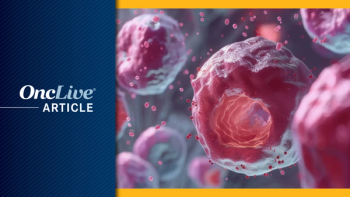
Supplements and Featured Publications
- ESMO 2023 Meeting Reporter: Updates in GU Cancers
- Volume 1
- Issue 1
Frontline Enfortumab Vedotin Plus Pembrolizumab Elicits OS Improvement in Advanced Urothelial Carcinoma
Key Takeaways
- Enfortumab vedotin and pembrolizumab improved OS and PFS in untreated mUC, reducing death risk by 53% and progression risk by 55% compared to chemotherapy.
- The combination therapy showed consistent benefits across subgroups, including PD-L1 status and visceral metastases, with a higher objective response rate than chemotherapy.
Frontline treatment with the combination of enfortumab vedotin-ejfv and pembrolizumab led to a statistically significant improvement in overall survival vs chemotherapy in patients with previously untreated locally advanced or metastatic urothelial carcinoma.
Frontline treatment with the combination of enfortumab vedotin-ejfv (Padcev) and pembrolizumab (Keytruda) led to a statistically significant improvement in overall survival (OS) vs chemotherapy in patients with previously untreated locally advanced or metastatic urothelial carcinoma (mUC), according to data from the phase 3 EV-302 trial (NCT04223856) presented at the
At a median follow-up of 17.2 months, treatment with enfortumab vedotin plus pembrolizumab (EVP) reduced the risk of death by 53% vs chemotherapy. The median OS was 31.5 months (95% CI, 25.4–not reached) in the EVP arm compared with 16.1 months (95% CI, 13.9-18.3) in the chemotherapy arm (HR, 0.47; 95% CI, 0.38-0.58; P < .00001). The OS benefit was observed regardless of whether patients in the control arm received cisplatin or carboplatin, and was not impacted by PD-L1 status or existence of visceral metastases.
Treatment with the combination also led to a significant improved in progression-free survival (PFS) versus chemotherapy. The median PFS was 12.5 months (95% CI, 10.4-16.6) with EVP compared with 6.3 months (95% CI, 6.2-6.5) with chemotherapy, translating to a 55% reduction in the risk of disease progression or death (HR, 0.45; 95%, 0.38-0.54; P < .00001). The PFS benefit was sustained across all pre-specified subgroups, such as those defined by cisplatin eligibility, PD-L1 status, and visceral metastases.
“This is the first time [in urothelial carcinoma] we've managed to beat chemotherapy in the first-line setting for overall survival, despite multiple previous attempts. Enfortumab vedotin and pembrolizumab showed significant decrease in the risk of death and a decrease in the risk of progression compared to chemotherapy. These results support enfortumab vedotin plus pembrolizumab as a standard of care in this setting,” said lead study author Thomas B. Powles, MBBS, MRCP, MD, director, Barts Cancer Centre at St. Bartholomew’s Hospital in London.
The open-label EV-302 trial included 886 patients with previously untreated locally advanced or mUC with an ECOG performance status of ≤2 who were eligible for cisplatin- or carboplatin-containing chemotherapy. The median age in both arms was 69 years and about three-fourths of patients were male. The majority of patients in the trial were White, making up 69.7% and 65.3% of the EVP and control arms, respectively. About 97% of patients in both arms had an ECOG performance status of 0 or 1.
In the EVP arm, the primary tumor location was upper tract for 30.5% of patients and lower tract for 69.0%. The rates were 23.4% and 76.4%, respectively, in the chemotherapy arm. Fifty-four percent of patients in each arm were cisplatin eligible and 72% had visceral metastases. Regarding PD-L1 status, 58% of in each arm had high expression (combined positive score [CPS] ≥10), with the remaining 42% having low expression (CPS <10).
Patients were randomized to standard of care chemotherapy consisting of gemcitabine plus cisplatin or carboplatin for a maximum of 6 cycles (n = 444) or enfortumab vedotin (1.25 mg/kg IV) on days 1 and 8 and pembrolizumab (200 mg IV) on day 1 of 3-week cycles (n = 442). The maximum number of pembrolizumab cycles allowed was 35 and there was no maximum number of cycles for enfortumab vedotin. The co-primary end points were OS and PFS (per blinded independent central review).
The confirmed objective response rate (ORR) was 67.7% in the EVP arm compared with 44.4% in the chemotherapy arm. The ORR in the EVP group consisted of a complete response (CR) rate of 29.1% and a partial response (PR) rate of 38.7%. The stable disease (SD) rate was 18.8% and the progressive disease (PD) rate was 8.7%. In the chemotherapy arm, the ORR consisted of a CR rate of 12.5% and a PR rate of 32%. The SD rate was 33.8% and the PD rate 13.6%.
The median number of cycles received was 12 (range, 1-46) for EVP and 6 (range, 1-6) for chemotherapy. Overall, 67% of patients in the EVP arm and 45.7% of patients in the chemotherapy arm remained on study at the time of the analysis. In the EVP arm, 34.6% of patients discontinued treatment due to progressive disease compared with 16.4% of patients in the chemotherapy arm. Adverse effect (AE)–related discontinuations occurred in 21.9% and 14.0% of the 2 arms, respectively. Regarding subsequent immunotherapy in the chemotherapy arm, 59% received a PD-1/L1 inhibitor and 30% of patients received maintenance avelumab.
“The safety profile of EVP was generally manageable, with no new safety signals observed,” said Powles. “Hematological toxicity was more prominent with chemotherapy, while peripheral neuropathy, rash, and hyperglycemia are adverse events of special interest with EVP.”
The safety data showed that 56% of patients receiving EVP and 70% of patients in the chemotherapy arm experienced grade ≥3 treatment-related AEs (TRAEs). Serious TRAEs occurred in 27.7% vs 19.6% of the 2 arms, respectively.
In April 2023, the FDA granted an accelerated approval to pembrolizumab plus enfortumab vedotin for the first-line treatment of patients with locally advanced or metastatic urothelial carcinoma who are ineligible for cisplatin-containing chemotherapy.2
References
- Powles TB, Perez Valderrama B, Gupta S, et al. EV-302/KEYNOTE-A39: Open-label, randomized phase III study of enfortumab vedotin in combination with pembrolizumab (EV+P) vs chemotherapy (Chemo) in previously untreated locally advanced metastatic urothelial carcinoma (la/mUC). Presented at: ESMO Congress 2023; October 20-24, 2023; Madrid, Spain. Abstract LBA6.
- FDA grants accelerated approval to enfortumab vedotin-ejfv with pembrolizumab for locally advanced or metastatic urothelial carcinoma. News release. April 3, 2023. Accessed October 22, 2023.
https://www.fda.gov/drugs/resources-information-approved-drugs/fda-grants-accelerated-approval-enfortumab-vedotin-ejfv-pembrolizumab-locally-advanced-or-metastatic



































